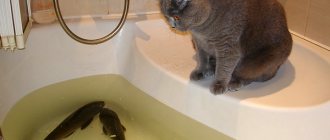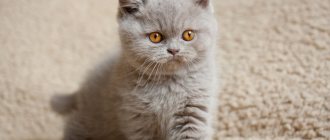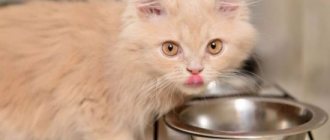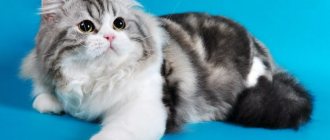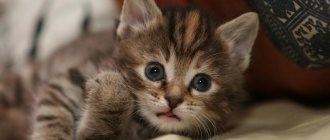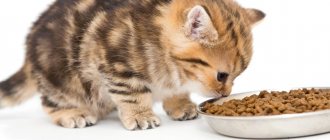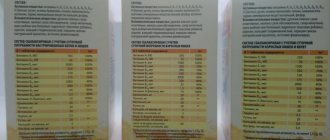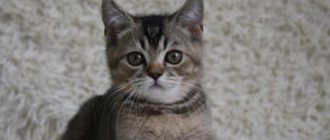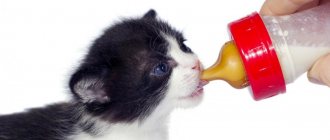In order for a new family member to fully develop and grow up absolutely healthy, it is necessary to develop the correct diet from the first days of the animal’s stay in the house. You will learn in our article what to feed a British kitten and what foods are best excluded from the menu of your four-legged friend. Take this issue seriously and responsibly, because healthy eating is the key to a long and happy life for your new furry friend!
A kitten of the British breed is an amazing animal with a beautiful face and funny manners! You won’t be bored with this pet; they are active and playful, but quite demanding in care.
You can find out the difference between a Briton and a Scot here
Feeding a British baby at 1 month
Any living creature needs breast milk after birth, and the British baby is no exception. In the first month of life, a cat should be under the reliable care of its mother cat. Her milk contains all the components necessary for growth and development.
During this period, it is important to provide the cat with proper nutrition so that the remaining milk can receive all the necessary substances, thanks to which the kitten will develop a strong immune system.
If the nurse has some health problems, or for some reason the kitten cannot be under the care of the parent, the owners of a furry pet should develop a healthy diet for the newborn. So, what to feed a British kitten in the first month of life:
- In pet stores you need to purchase special milk for newborn kittens. This product contains a correctly selected composition of components, close to breast milk.
- Gradually, mashed egg whites and liquid semolina porridge cooked in skim milk can be added to the diet. Portions should be minimal. The number of feedings per day is 3-4 times. These foods are also included in the diet of breastfed kittens.
Primary requirements
Every cat owner should remember that your pet is one hundred percent a predator. This is where cats differ from dogs - over thousands of years of domestication, dogs have learned to eat the same food that their owner eats, but cats still require meat in order to grow and develop normally.
British babies are no exception in this regard. The basis of their diet should be meat . It is recommended to feed a British cat beef products. This meat is easily digested by your furry pet's delicate stomach.
It is best to feed cooked meat, as raw ground beef may contain parasitic larvae that are dangerous not only to cattle, but also to predators.
© shutterstock
Feeding a British baby at 2 months
The first month of the furry baby's life has passed. His body now requires additional elements. Before feeding a 2-month-old British breed kitten, you need to study the list of acceptable foods necessary for proper growth and development.
Starting from 4-5 weeks of life, solid food can be gradually introduced into the menu. It is better to start with low-fat beef, previously frozen and finely chopped. For one feeding, a serving of 10-15 g is sufficient.
Your baby's diet should also include:
- fresh milk;
- delicious milk porridges cooked with low-fat milk;
- natural soft cheese;
- low-fat cream;
- egg yolk;
- fresh cottage cheese.
You can supplement the menu with pates and canned food purchased from specialized pet stores or veterinary pharmacies. The manufacturer's recommendations regarding age restrictions must be indicated on the packaging.
Experienced breeders do not advise buying cheap products of questionable quality. If you want to pamper your furry baby, buy him a good product from a reliable manufacturer!
Important:
- when introducing new foods into your lop-eared pet’s diet, monitor his body’s reaction;
- do not exceed the permissible limits when feeding the baby, overeating can be fraught with consequences;
- Don’t be lazy to cook separately for a purebred cat; he should not eat food with seasonings, spices and other additives typical of foods consumed by humans.
Feeding a British baby at 3 months
The three-month-old British shorthair delights his new family with his first achievements and skills. At this age, kittens already go to the toilet on their own, spend a lot of time in active games and enjoy exploring the world around them.
In order for this process to be as beneficial as possible for the growing body, it is necessary to continue to properly feed British kittens, including all new products in the individual menu.
What to feed British kittens at four months:
- milk;
- egg yolk;
- boiled or raw frozen meat (beef, chicken);
- by-products are added to the diet;
- dairy products;
- canned food for 3 month old kittens;
- boiled sea fish without bones;
- porridge;
- grated vegetables.
The number of feedings per day is 4 times. Portions are moderate. You should not give your kitten several new foods at once. It is necessary to gradually introduce additional ingredients, not forgetting to monitor the baby’s condition.
Which diet to choose: the pros and cons of “drying” and “natural”
The owner must decide immediately what to feed British kittens. You cannot mix or constantly change natural feeding and ready-made food. Even single-component holistic products are not recommended to be alternated with conventional products.
The good thing about ready-made food is that you can buy it in small wholesale at a pet store or order it on a specialized website. Also, a jar of kitten food is usually designed for a daily diet, which means you won’t overfeed your cat. And in general, a ready-made diet is always more convenient than preparing food for your cat every day.
But this is where the cost of feed comes into play. If you do not think through the diet in advance and do not purchase with maximum profit, then the nutrition budget for a British kitten can be significant. These breeds can only eat super-premium or holistic food, and they are not cheap.
The natural type of feeding also requires planning and preparation, but you can still combine purchases with your own daily consumption. For example, you can use all the milk suitable for kittens for baking. The kitten eats its portion from the package, and the impressive leftovers will always find use in human recipes.
The same goes for meat - lean turkey fillet can be easily processed into semi-finished products for a kitten; you can cook any excess for yourself. Vegetables, fruits, cereals - all these are products for general use that are not purchased selectively only for the kitten.
The issue of daily cooking can also be solved with natural feeding. There are a lot of recipes for cats that help you create a diet for several days, although you will still spend more time on them than on ready-made food.
One of the disadvantages of natural products is the need for self-dosing, because we must not forget about the daily amount of food and the volume of each serving. Evenness of food intake is very important for a small British kitten.
Also, with a natural diet for a British kitten, it is difficult to maintain the balance of vitamins, which are already collected in ready-made food, taking into account breed and age characteristics. A veterinarian will help you resolve the issue, especially if you keep a diary of your kitten’s food.
Feeding a British baby at 4 months
At the fourth month of life, the fold-eared purebred cat is already a fully formed animal, with beautiful shiny fur and adult behavior. It has already increased significantly in size, its weight exceeds its original parameters by about three times. At this age, you can safely add special dry food for British kittens to your diet. The number of feedings is reduced, and the dosage of portions is increased.
The main menu continues to be dominated by products acceptable for feeding kittens 3 months of age. Approximately 25-30% of the total diet consists of dry food. During this period, the owner needs to decide on the manufacturer of cat food, giving preference to proven brands. You can consult your veterinarian on this issue, not forgetting to take into account personal observations of your furry pet.
High-quality food is sold at a higher price, but this is not a reason to save on the health of your new friend. You should not buy food for your domestic cat in dubious places; it is better to purchase nutritious products from pet stores that are certified for animal products.
Breeders do not recommend purchasing feed in bulk at local markets. The quality of such products is very questionable, which means that feeding these compounds can negatively affect the health of the animal.
If your kitten keeps you up at night
If a small kitten squeaks at night or early in the morning and wakes you up. Firstly, if you adopted the kitten on time and not too young, he will no longer miss his mother so much and will not wake you up at night.
If he still wakes you up, you can tell him “no.” Pet him if he is small and bored. It's like a little child, he needs your love and affection, because now you are his mom or dad. Who else can he trust if not you?
It could also be that he is locked in a room with no access to a toilet. Or he just wants to eat, but there is no cup of food nearby. My cat sleeps in the same room where he has a toilet and where he has a cup of food. Therefore, there is no need for him to wake us up at night if he wants to go to the toilet or is hungry.
By the way, I noticed that many cats usually go to the toilet either late in the evening or early in the morning. But maybe it's just my cats that do this?
Of course, the kitten may simply become bored; he has already slept! He wants to play and calls mom or dad - play with me! Usually I manage to explain to him that I wouldn’t mind sleeping, and he goes to play with his toys himself.
Therefore, you need to give him different toys so that he can occupy himself while you sleep. In general, there should be enough toys so that the cat (especially a small kitten) does not get bored while you are at work. Kittens play constantly, with everything that comes under their paw. So, to prevent your new cell phone or collectible watch from falling under his paw, give him something that he can throw, drop and bite. It will be better for you.
You can also play with the cat before bed to make it tired, and then give it a piece of raw meat. This will extinguish the hunter's instinct, because all cats are hunters! And precisely at night. And since she already seemed to have hunted, she can sleep peacefully.
In general, if you love your cat or cat and strive to understand them, you will not have any problems with raising them. Especially with the Scots, since they are already very smart and kind, initially. You can achieve mutual understanding with your pet only with kindness, care and love. In return, you will receive the same care and love from your pet. With cats it is very simple, if you care for it and love it, then it will always love you back.
Cats do not know how to take revenge, take offense, they do not know how to betray, or do something out of spite. All deviations from normal cat behavior are ALWAYS the responsibility of the owner. It was the owner who did something wrong. We need to find out what it is and fix it. And the cat’s behavior will improve.
Cats, unlike dogs, are not initially herd animals. Therefore, if a cat follows you around, purrs on your lap and hugs you by the neck, it means that she really LOVES you, and this is not a herd instinct.
Feeding a British baby at 6-12 months
In the second half of the first year of life, the British reproductive system matures. This period is somewhat difficult both for the pet itself and for its owner. Some difficulties may arise when raising a British cat, which is already beginning to show its character.
In order for your furry friend to show maximum calm and not upset his owner with hooligan actions, it is necessary to continue proper nutrition, thanks to which the British dog will develop good behavioral manners and obedience.
What can you feed a British cat from 6 months of age:
- dairy products;
- egg yolk;
- boiled meat, frozen;
- boneless fish;
- porridges of different types;
- pieces of fruit and vegetables;
- crackers, rye bread;
- offal;
- ready-made canned food for cats by age;
- dry food is a priority, making up about 50% of the total diet.
From this age, the animal’s body no longer copes well with digesting lactose, so milk and milk cereals are gradually removed from the pet’s diet.
At 6-8 months, the number of feedings per day is 3 times; closer to a year, the number of meals is reduced to two times.
How to feed a British kitten
How to properly feed an animal up to a year old?
- For the first 3 or even 4 months, milk should be mother's milk if possible. The minerals, proteins and vitamins included in its composition help build the pet’s immunity.
- You can start feeding your baby from about 2 months. But mother's milk should still make up the bulk of the diet. Complementary feeding, ideally provided 6-8 times a day, is recommended to be made up of the following products - porridge with milk, natural cottage cheese, cream, and a little scraped beef.
- Starting from 3 months, you can try adding some by-products, vegetables and fruits, yolk, and boiled sea fish.
- After 4 months, exposure to chicken, regular milk and fermented milk products is allowed. The frequency of meals is reduced to 4-6 times a day.
- Starting from 6-10 months, the kitten should eat 3 or 4 times a day. It is permissible to diversify its menu with rabbit meat. Some veterinarians recommend focusing more on fermented milk products rather than pure milk.
- Starting from 10 months, the animal eats twice a day. It is quite possible to draw a parallel between its menu and the diet of an adult feline.
Introducing homemade food into the kitten's diet
Owners of British breed cats independently determine the type of food for their animal. You can give priority to feeding your pet canned food and dry food created specifically for kittens, but in any case, a carnivorous animal by nature needs meat, so this ingredient must be present in the daily diet.
The best type of meat is beef. It should be given raw, after having been frozen in the refrigerator for three days. Before feeding, the product is treated with boiling water, which allows you to destroy dangerous helminths and other harmful microbes.
It is better to feed young British kittens with ground beef prepared independently. You should not add salt and other spices to the finished composition that are unacceptable for feeding purebred cats. You can also give your baby finely ground raw food.
A large, straight-eared pet can independently absorb meat from larger pieces, but to avoid unnecessary problems, experts still recommend pre-cutting the meat to make it easier for the animal to absorb food.
Starting from 2 months of age, a British dog can be given boiled beef liver once a week. About 3-4 times a week, boiled offal of various types is added to the main menu. The serving should not exceed 100 g.
Kittens also need lean fish, preferably of sea origin. It can be served raw. The product is first frozen, doused with boiling water, and cleared of bones and skins. Fish should be given to a Briton no more than 2 times a week.
Once a week, the diet of a furry family member should include boiled chicken eggs, in particular the yolk, previously crushed. This product can be served in combination with canned food or porridge.
As for the porridge:
- up to three months, a small kitten is fed milk porridge, diluted with water, without sugar;
- from 6 months, porridge is cooked exclusively in water, without milk;
- this product is added to the diet 3-4 times a week;
- priority is oatmeal, semolina and rice porridge;
- You can give a ready-made dish in combination with meat ingredients or canned food for kittens.
The diet of a domestic cat should also include boiled vegetables: cauliflower and carrots (good for the eyes). A drop of vegetable oil is added to the crushed product. They can also be mixed with porridge and meat.
3-4 times a week, a British kitten should be given low-fat fermented milk products: kefir, cottage cheese, yoghurts (natural), cream, kefir. Adult cats should have this food no more than 2 times a week. Be sure to keep an eye on the expiration dates of store-bought products. Do not feed your furry pet dairy products that have expired and are of questionable quality, as this can cause serious poisoning and other adverse consequences.
The British diet, based on natural products, is very useful and necessary for healthy growth and proper development. You cannot feed the animal food from your table, only separate food preparation, without salt, spices and other additives! Avoid overeating, as your cat may become fat and develop chronic illnesses.
Natural food
A change of environment can cause stress even in humans, let alone pets. If you decide to get a cat of this breed that is several months old, then you do not need to feed it in the first days with what you have at home. You should find out his diet, what he ate when he lived with his mother, and in the first few days he should be fed exclusively with such food.
If you don’t know what to feed a British kitten several months old, then we will help you figure out this issue. If you decide to properly feed your cat natural food, then keep in mind that it is better to exclude fatty foods from the cat’s diet.
Otherwise, this will cause stress on the internal organs of the lop-eared pet (or straight-eared, it doesn’t matter), which can cause stomach upset
What should the diet be like? In any case, feeding British domestic cats should contain meat and poultry products, in particular chicken and poultry. Beef heart or kidneys are quite suitable. If you decide that feeding should be done with meat, then you can and even need to boil it before giving it to your pet, or simply treat it with boiling water. If you feed a cat meat, then it should not contain helminths or other parasitic carriers.
If you eat chicken, you also need to boil it before eating. The skin must be removed as it is the cause of loose stools in British cats. The meat should be finely chopped and not contain bones. British cats love to eat boiled buckwheat and rice porridge with meat, but there should be twice as much meat as side dish.
In addition, cats love boiled eggs. The yolk can be mixed with meat or porridge and given to the cat separately. If you want your lop-eared to have good health, then add quail eggs to the meat. Such eggs are healthy and full of vitamins. As for vegetables, British cats easily digest carrots, cucumbers, and zucchini. It is better to give it boiled, but you can also give it raw.
Cats usually eat 2-3 times a day.
Kitten food
The diet of kittens at one month of age will differ from that of big cats. Such cats need to be weaned off breast milk from about three weeks of age. If the kitten is more than one month old, then it should already be eating on its own. From about one month onwards, kittens can be given baby puree or baby cottage cheese with the addition of cream and lactobacilli. It wouldn't hurt to add quail eggs.
After a few days, maybe a week, you can add boiled meat to the kitten’s feeding. At first it should be given no more than a teaspoon, and in the first days even less. Over time, portions of meat can be increased. And cats that are one and a half months old can already be switched to an adult diet. The main thing is that all products are of high quality and fresh.
Also, cats from one month of age can start feeding fermented milk products. It is better that all products are not fatty: cottage cheese, kefir, cream or yogurt, only unsweetened. It is correct to feed cats “sour milk” after meals and it is better to give it a little at a time.
As for how much food is best to give to a cat one to two months old, see for yourself depending on the situation. Usually at this age they eat little, leaving some of the food in the bowl. But you don’t have to worry about this topic. With age, your appetite also increases, so portions can be increased over time. It is better to underfeed your pet than to overfeed it. After all, if he is underfed, he will tell you about it himself.
Dry and wet food for the British
A more simplified method of feeding a British cat is based on ready-made food. This option is great for owners who are unable to regularly prepare healthy food for their pets. The main thing is to choose the right food and calculate the daily intake in accordance with the age of the kitten.
Responsible manufacturers create high-quality products that contain all the vitamin and mineral complexes necessary for the British. The range of such products includes a wide variety of compositions in dry and canned forms. When choosing, be sure to study the manufacturer’s recommendations published on the packaging!
Which food to choose, dry or wet, is up to you! You can combine these two types in an approximate ratio of 50/50, 60/40 or 70/30%. If the British cat is fed exclusively dry food, it is necessary to provide the animal with free access to clean drinking water.
The canned product is placed in a clean bowl in strictly measured quantities for one feeding. It is unacceptable to leave food “for later”; after each feeding, the animal’s bowl is cleared of product residues and thoroughly washed with clean water.
Advice from experienced breeders:
- For favorable growth and development, combine dry food with wet food. It is better to serve canned products for breakfast and dinner, and during the day you can feed your pet with dry food.
- Even if you feed your cat exclusively prepared food, regularly add pieces of fresh meat to the standard diet.
- The best food for a purebred British dog is premium (for example, Whiskas, Hills). Do not buy the budget version of the product, as these formulations do not contain enough necessary elements for proper growth and development. After feeding with cheap food, complications in terms of physical health are often observed. If you consume low-quality products, your kitten may develop urolithiasis and other chronic ailments.
- If you plan to castrate a mature British cat, buy special food with the appropriate label. These products contain a balanced complex of essential microelements, taking into account hormonal changes in the animal’s body. Similar rules are followed for cats that have been sterilized.
Mixed nutrition - the choice is yours
You, dear owners of British cats, must decide which feeding option is right for you, and then bear responsibility for your choice and for the health of your animal. You may also find it useful to read the article “Prevention of ICD in neutered cats.”
5. You cannot feed or give dry food as a treat during natural feeding, and vice versa. Not once a week, not once a month, not possible.
6. It is strictly not recommended to mix food from different manufacturers. If you feed your British animal dry food and want to diversify the diet with wet canned food, then this should be no more than 25% of the daily diet, and the canned food should be from the same manufacturer and from the same line of food.
Prohibited Products
British cats should not be fed the following foods:
- fatty meat;
- bones;
- river fish;
- fatty fermented milk products;
- egg white;
- sausages;
- conservation (for people);
- fried foods;
- spicy and salty foods;
- sweets, chocolate;
- baking, baked goods;
- food from your table.
The right approach to feeding a British breed cat is the key to good health and long life for a furry family member!
Some external features
All representatives of the breed, regardless of their color, place of residence and characteristics of care, have a number of appearance characteristics. Using them, you can determine the kitten’s species:
- Round head, wide cheekbones and short neck;
- Short and straight nose, small and low-set rounded ears;
- Big eyes;
- Grounded, massive body;
- Short, but quite thick paws;
- Thick, medium-sized tail;
- Short but very thick coat.
3 month old British babies © shutterstock
